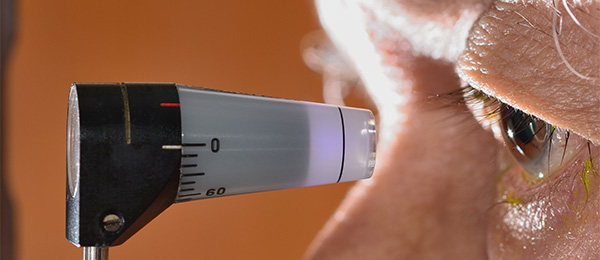
Savera Hospital
Amritsar Road, Opp. Dera Beas Moga
Phone Number
+(91) 9855827744
Send Your Mail
santnetralaya@gmail.com
Glaucoma
What is Glaucoma?
Glaucoma is a group of eye conditions that damage the optic nerve, which is essential for transmitting visual information from the eye to the brain. This damage is often associated with increased pressure within the eye, known as intraocular pressure (IOP). Glaucoma is a leading cause of irreversible blindness worldwide and can progress gradually over time, often without noticeable symptoms in the early stages. If left untreated, glaucoma can cause permanent vision loss and blindness.
Types of Glaucoma:
Primary Open-Angle Glaucoma (POAG): This is the most common form of glaucoma and typically develops gradually over time. In POAG, the drainage angle of the eye becomes less efficient at draining fluid (aqueous humor), leading to a gradual increase in intraocular pressure and damage to the optic nerve.
Angle-Closure Glaucoma: Also known as closed-angle glaucoma or narrow-angle glaucoma, this form of glaucoma occurs when the drainage angle of the eye becomes blocked, causing a sudden increase in intraocular pressure. Angle-closure glaucoma can be acute (sudden onset) or chronic (gradual onset) and requires immediate medical attention to prevent vision loss.
Normal-Tension Glaucoma: In this type of glaucoma, optic nerve damage occurs despite normal intraocular pressure. The exact cause of normal-tension glaucoma is not fully understood, but it is believed to involve factors such as reduced blood flow to the optic nerve or increased susceptibility of the optic nerve to damage.
Secondary Glaucoma: Secondary glaucoma refers to glaucoma that develops as a result of another eye condition or underlying medical condition, such as eye trauma, inflammation, or certain medications.
Symptoms of Glaucoma:
In the early stages, glaucoma often does not cause noticeable symptoms, which is why it is often referred to as the “silent thief of sight.” As the condition progresses, however, symptoms may include:
- Gradual loss of peripheral vision (tunnel vision)
- Blurred vision
- Halos around lights
- Eye pain or redness
- Headaches
- Nausea or vomiting (in acute angle-closure glaucoma)
Treatment of Glaucoma:
While there is currently no cure for glaucoma, treatment aims to lower intraocular pressure and prevent further damage to the optic nerve. Treatment options may include:
- Eye drops to reduce intraocular pressure
- Oral medications
- Laser therapy (such as trabeculoplasty or iridotomy)
- Microsurgery (such as trabeculectomy or shunt implantation)
Early detection and treatment are crucial for managing glaucoma and preventing vision loss. Regular eye exams, including measurement of intraocular pressure and assessment of the optic nerve, are essential for detecting glaucoma in its early stages when treatment is most effective. If you have risk factors for glaucoma or experience any symptoms, it’s important to consult an eye care professional promptly for evaluation and appropriate management.
Other Services

Comprehensive Exams

Dry Eyes Services

Advanced Ocular Care
Why Patients Choose Savera Eye Hospital
Patients choose Savera Eye Hospital for a variety of reasons, each reflecting our commitment to excellence in eye care and patient satisfaction. Here are some of the key factors that set us apart and make us the preferred choice for individuals seeking trusted eye care services.
01
Medical Experience
Savera Eye Hospital boasts a team of highly skilled and experienced ophthalmologists, optometrists, and support staff dedicated to delivering exceptional eye care. Our specialists have undergone rigorous training and possess extensive expertise in their respective fields, ensuring that our patients receive the highest standard of care.
02
Art Technology
We invest in cutting-edge technology and advanced equipment to provide precise diagnoses and effective treatments for a wide range of eye conditions. From diagnostic imaging tools to surgical instruments, our state-of-the-art facility is equipped with the latest advancements in eye care technology.
03
Comprehensive Services
Savera Eye Hospital offers a comprehensive range of eye care services, including routine eye exams, cataract surgery, refractive surgery, glaucoma management, retinal services, pediatric eye care, and more. Whether you need preventive care or specialized treatment, we have the expertise and resources to meet your needs.
04
03
Personalized Care
We understand that each patient is unique, and we take a personalized approach to care. From the moment you walk through our doors, our dedicated team takes the time to listen to your concerns, answer your questions, and develop a customized treatment plan tailored to your specific needs and goals.
04
04
Commitment to Quality and Safety
We adhere to the highest standards of quality and safety in everything we do. From maintaining strict infection control protocols to following evidence-based practices, we prioritize patient safety at every step of the way. Our commitment to quality is reflected in our consistently excellent outcomes and high patient satisfaction rates.

Savera Hospital was established in 2010 by Dr. Rajiv Kumar Gupta with the aim to provide high-quality, accessible and affordable eye care for all.
Make Appointment
- Monday - Saturday 09 AM - 04 PM
- SUNDAY 10 AM - 01 PM
Powered by Savera Eye Hospital- Moga (Punjab)
Copyright © 2024. All rights reserved.
